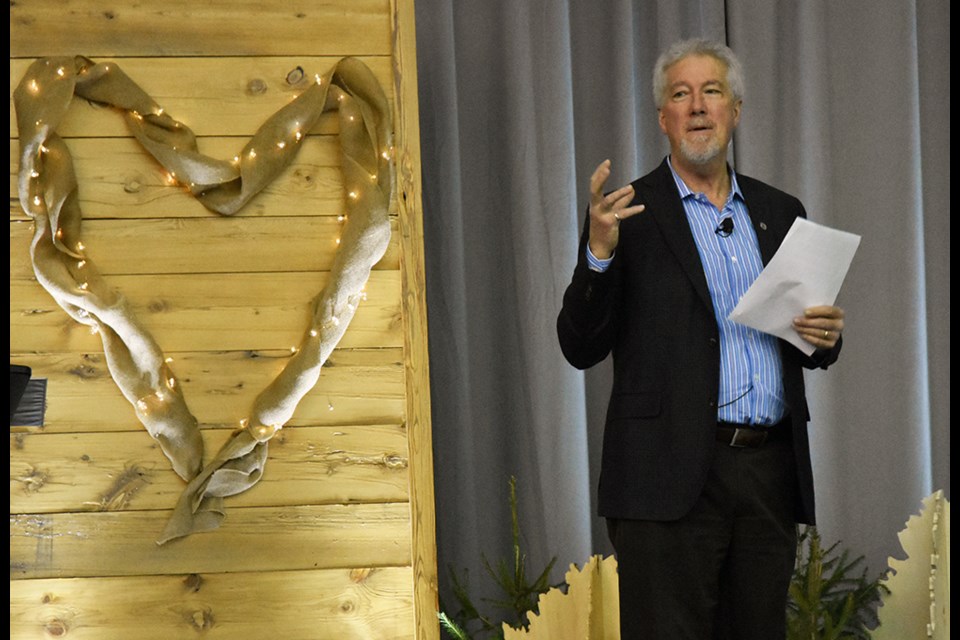The sixth annual Forests Ontario conference, held at the Nottawasaga Inn Resort near Alliston on Valentine’s Day, was all about partnerships and collaboration.
Not only did the conference bring together approximately 400 forestry professionals, conservationists, landowners, Indigenous people, educators, and students from both the University of Toronto and Fleming College, speaker after speaker talked about the importance of partnerships in today’s evolving forestry sector.
The theme of the 2020 conference was “We the Forest.”
Forests Ontario CEO Rob Keen noted that 2019 had been “a bit of a rollercoaster” – with Doug Ford’s Provincial government suddenly cancelling funding for the 50 Million Tree planting program in April, at the very time when scientists and governments around the world were beginning to recognize the importance of tree-planting as a tool to fight climate change.
“The silver lining was the incredible response from the public, right across Canada,” Keen said. “People were dumbfounded.”
A petition calling for reinstatement of the funding gathered 100,000 signatures, and in June, the Federal government stepped in, announcing four years of funding support.
“We would have lost the Southern Ontario tree-planting program without that support,” Keen said, noting that the program is now “healthy and sustainable,” thanks to the new partnership.
“Collaborations are essential,” he said.
It was a message repeated by several of the speakers, including Stefan Webber.
Webber, a seed collector for the past 17 years, a graduate student at McMaster University, and founder of the Ontario Plant Restoration Alliance, described the networks that have been established to ensure a supply of seeds for naturalization and habitat restoration projects.
Without “the right seeds in the right places at the right times,” Webber said, it wouldn’t be possible to bring back natural prairies, or restore native habitat in disturbed areas, like roadsides – not only bringing back natural assemblies of plants, but their pollinators and other insects.
The partnerships between the Ontario Plant Restoration Alliance, municipalities and government ministries, conservation authorities, scientists, and seed sources like the St. Williams Nursery and Ecology Centre have made it possible to rebuild biodiversity “from the ground up,” he said.
The St. Williams Nursery & Ecology Centre has created “rare plant seed conservation gardens” and “seed orchards” on over 100 acres land, with up to 500 native species planted in wildflower fields, including rare sand violet, pale coneflower, wild bergamot, blue lupin, and butterfly milkweed.
The fields also provide habitat. “What’s good for the plants is good for everything else,” Webber said, noting that the collaborative effort has bought back species at risk, reassembled plant communities, and restored natural habitat.
Other themes at the conference included innovation and sustainability, from George Brown College’s “Arbour Project” at Queen’s Quai in Toronto – a 12-storey massed timber building designed by Moriyama & Teshima Architects - to the use of sustainable forest products as a replacement for single-use plastics.
“We the Forest” included displays by partner organizations, a fund-raising silent auction, and a Forestry poster contest for students at Fleming College, wrapping up with a panel discussion on Inspiring Change, and a closing address from Tim Johnson, Director of Nations 360's Indigenous Education Initiative.
Even this year’s Forests Ontario Awards reflected a theme of “collaboration.”
The Robert de Pencier Award was presented to Sambath Kumaar, recognizing his efforts to raise awareness of the impact of the Provincial cancellation of the 50 Million Tree Program, and launch of a petition calling for the reinstatement of funding, that gathered 100,000 signatures.
The Green Legacy Award was presented to corporate partner Canopy Growth, which contributed $100,000 to Forest Ontario’s 50 Million Tree Program.
And MVP (Most Valuable Planter) Award went to Wayne Pawson, First Resource Management Group Inc., for his work planting 600,000 trees.
Other awards recognized educators, scientists and foresters, all working together to promote and preserve Ontario’s forests.



